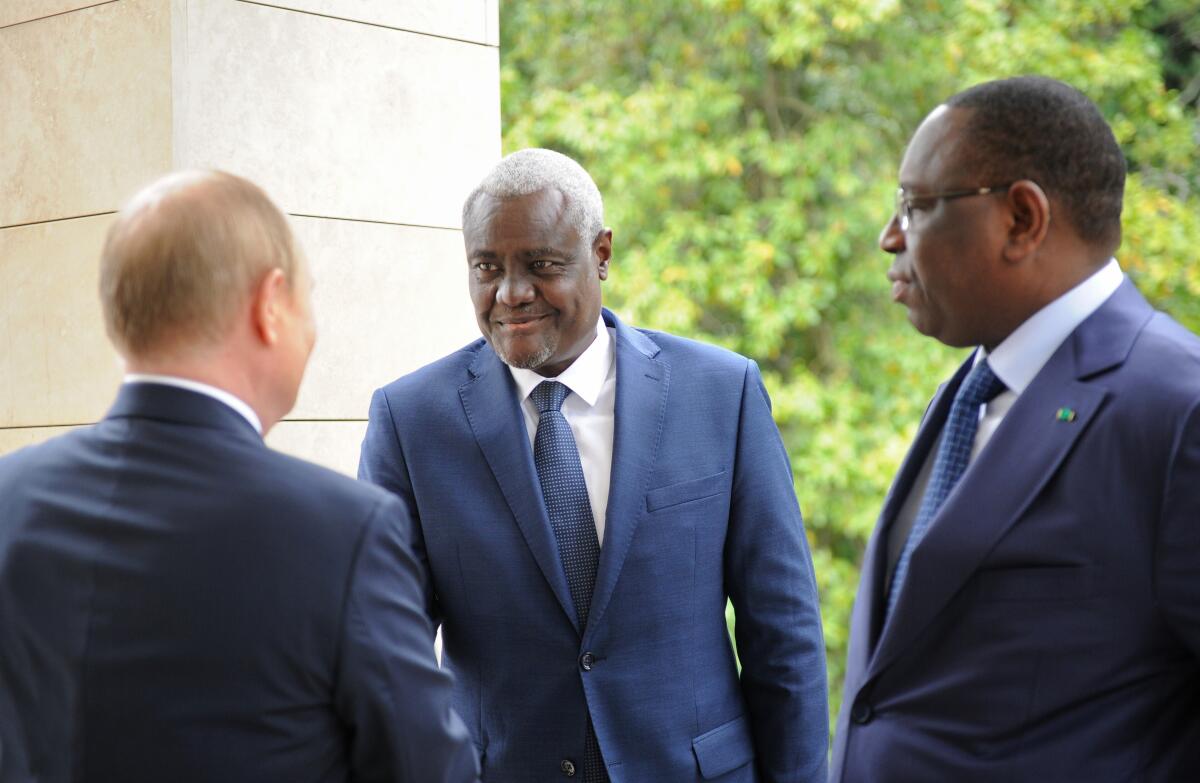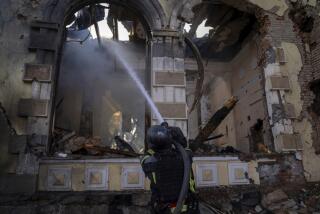African Union head discusses grain supply with Putin

MOSCOW — The chairman of the African Union, Senegal’s President Macky Sall, told Russian President Vladimir Putin on Friday that the fighting in Ukraine and Western sanctions have worsened food shortages. Sall also appealed to other countries to ensure that grain and fertilizer exports aren’t blocked.
Putin blamed the West for the emerging global food and energy crises and repeated his government’s offers of safe passage for ships exporting grain from Ukraine.
“We will facilitate the peaceful passage and guarantee the safety of arrivals to these ports, as well as the entry of foreign ships and their movement through the Azov and Black seas, in any direction,” Putin pledged, in remarks carried on state TV after his meeting with Sall in the Black Sea city of Sochi, Russia.
Ukraine and its allies have said Russian ships are to blame for blocking Ukraine’s grain exports.
African countries have been hit especially hard by the food shortages and price increases. The continent imported 44% of its wheat from Russia and Ukraine between 2018 and 2020, according to United Nations figures, and wheat prices have soared 45% as a result of the supply disruption, according to the African Development Bank.
Russia, the world’s largest wheat exporter, has urged the West to lift sanctions imposed over its military action in Ukraine so that grain starts flowing freely to global markets. While food and fertilizer are exempt, sanctions have targeted Russian shipping and made international shipping companies reluctant to transport Russian cargo.
“The fact that this crisis brought the cessation of exports from Ukraine but also from Russia because of sanctions — we have found ourselves in between these two,” Sall told reporters. “It’s of absolute necessity that [Western partners] help to facilitate the export of Ukrainian grains, but also that Russia is able to export fertilizers, food products but, mainly, cereals.”
In citing sanctions as a contributing factor, Sall is partly supporting Putin’s explanations. The Russian president appears to be attempting to drive a wedge in international support for sanctions and emphasize that other countries are suffering more than Russia: in terms of inflation, shortages of goods, the burden of refugees from Ukraine and the burden of economic and military aid to Ukraine.
Britain last week accused Russia of “trying to hold the world to ransom” by demanding relief from Western sanctions to allow grain exports.
Ukraine is one of the world’s largest exporters of wheat, corn and sunflower oil. Authorities there and in the West have accused Russia of blocking Ukrainian ports to halt exports, endangering world food supplies.
“Russia has played hunger games recently to put the blame on Ukraine and others for blocking Ukrainian food exports,” Yevheniia Filipenko, the country’s envoy to the U.N. office in Geneva, said in an interview Friday.
Putin on Friday again denied blocking Ukrainian ports and said it was a “bluff” to blame Russia.
“Of course, we are now seeing attempts to shift the responsibility for what is happening on the world food market, the emerging problems in this market, onto Russia,” he told Russian TV. “I must say that this is an attempt, as our people say, to shift these problems from a sick to a healthy head.”
Putin on Friday proposed several corridors to allow foreign ships to safely leave ports along the Black and Azov seas. Ukraine has said it was ready to agree on safe corridors in principle but voiced concern that Russia could use them to attack Odesa and other Ukrainian ports. The Russian president said ports under Ukrainian control can be used for exports after mines are removed, via Ukrainian ports now under Russian control — Berdyansk and Mariupol — or via other countries, such as Belarus.
But Sall noted problems with the Belarus option. “Another way is to pass through Belarus, but Belarus is also under sanctions, although it’s the most direct way in reality, through Belarus to the Baltic Sea,” he said.
The supply chain issues brought on by the fighting in Ukraine come as large portions of Africa already were grappling with drought and other problems.
Senegal was one of 17 African nations that abstained from voting on the U.N. resolution condemning Russia’s military action in Ukraine. According to the partial Kremlin transcript, Sall told Putin many African countries didn’t condemn Moscow despite what he described as strong pressure to do so.
The U.N. has warned that 18 million people are facing severe hunger in the Sahel, the part of Africa just below the Sahara Desert, where farmers are facing their worst agricultural production in more than a decade. Another 13 million people face severe hunger in the Horn of Africa region as the result of a persistent drought.
With the conflict in Ukraine in its fourth month, world leaders have ramped up calls for solutions. World Trade Organization Director-General Ngozi Okonjo-Iweala said about 25 million tons of Ukrainian grain are in storage, and another 25 million tons could be harvested next month.
More to Read
Sign up for Essential California
The most important California stories and recommendations in your inbox every morning.
You may occasionally receive promotional content from the Los Angeles Times.










